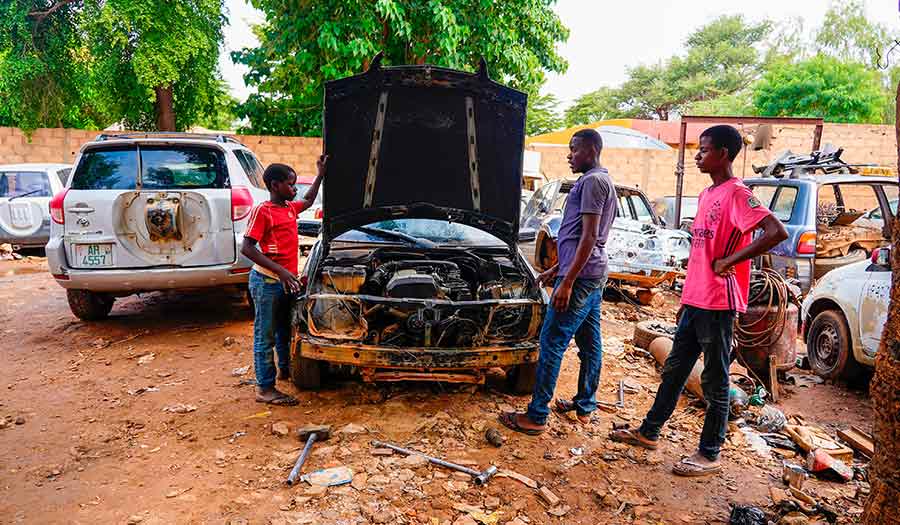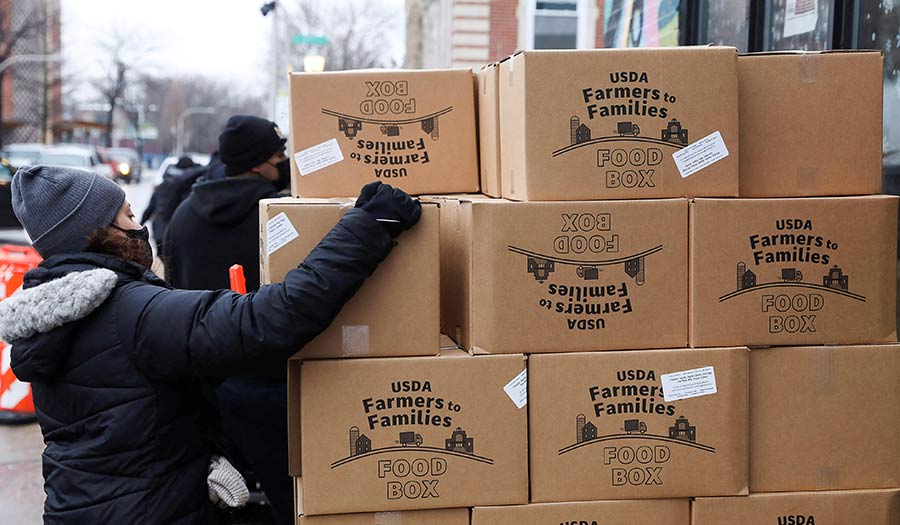 AP/Sam Mednick
AP/Sam Mednick
World News Desk
Learn the why behind the headlines.
Subscribe to the Real Truth for FREE news and analysis.
Subscribe NowNIAMEY, Niger (AP) – Hamsa Diakite cannot remember the last time her family of eight had a good meal.
She once sustained them by selling fried bread until a coup in Niger three months ago resulted in sanctions against the West African nation, squeezing incomes in one of the world’s poorest countries and leaving millions like Hamsa struggling in the absence of aid.
“Not only is food very expensive, but school supplies have also doubled in price. I also have to clothe my children and, above all, deal with their illnesses,” the 65-year-old said.
After elite soldiers toppled Niger’s democratically elected President Mohamed Bazoum on July 26, the country faced economic sanctions from West Africa’s regional bloc, ECOWAS, as well as Western and European countries including the United States that had provided aid for health, security and infrastructure needs.
Neighbors shut their borders with Niger and more than 70 percent of its electricity, supplied by Nigeria, was cut off after financial transactions with West African countries were suspended. Niger’s assets in external banks were frozen and hundreds of millions of dollars in aid were withheld.
The sanctions are the most stringent yet imposed by the regional bloc in an effort to stem the tide of coups in Africa’s volatile Sahel region, but they have had little or no impact on the junta’s ambition.
Instead, they have hit hard Niger’s more than 25 million people.
“We are quickly running out of funding, medicines. People are running out of food,” Louise Aubin, the United Nations resident coordinator in Niger, told The Associated Press. The junta has since told her to leave Niger over allegations the global body is blocking the country’s participation in its activities. The UN has not commented on the allegations.
Ms. Aubin said there had been “positive responses” from Niger’s neighbors to the idea of reopening borders for a humanitarian corridor, but did not give details.
The world’s third least developed nation, according to UN estimates, Niger in 2021 received $1.77 billion in assistance, more than half for humanitarian aid as well as social infrastructure and services. All of it is now in jeopardy.
Even the country’s 2023 budget, which was meant to be largely funded through the now-withheld external support from donors and loans, has been slashed by 40 percent.
Rather than deter the soldiers who deposed Mr. Bazoum and keep him under house arrest, the sanctions have emboldened the junta. It has set up a transitional government that could remain in power for up to three years.
That appears to have the support of many Nigeriens who felt the democratic government performed below their expectations, according to Seidik Abba, a Nigerien researcher and president of the International Center for Reflection for Studies on the Sahel think tank.
Even as they feel the pinch of sanctions, many people on the streets of Niamey, the capital, say they support the coup. They dismiss concerns from the West, which saw Niger as its last remaining strategic partner in its counterterrorism fight in the Sahel.
“The military sees that the people are supporting them, so they are using that support as a tool of legitimacy to hold on to power,” Mr. Abba said. For some junta supporters, the hardship brought by the sanctions is a worthy sacrifice, he added.
“The love of homeland has made us forget the hard times that the entire country is going through,” said Abdou Ali, one supporter in the capital. “No one cares about this rise in the price of goods.”
Aid workers and other observers working with the local population might disagree.
“We are trying to respond to a catastrophic situation for the country,” said Dr. Soumana Sounna Sofiane, secretary-general of the pharmacists’ union in Niger.
Many drugstores across Niger are running out of essential supplies at a time when the country faces public health emergencies including cholera. Desperate for a solution, pharmacies have started to give patients alternative medications to the ones they require.
Food is also running short. Rising inflation and high food prices are “significantly impacting communities’ capacity to make ends meet,” the UN World Food Program’s country office said. The agency said 3.3 million people in Niger were facing acute food insecurity even before the coup.
Niger is West Africa’s second largest country in landmass but it is landlocked, leaving it heavily reliant on trade with neighbors that now has paused. Food and drug supplies were among the top imported products last year.
Now, at the border with Benin, trucks loaded with goods and relief items are lined up for several miles waiting to enter Niger, though some are in transit to other countries.
More than 9,920 tons of WFP cargo, including specialized foods for the treatment and prevention of malnutrition, destined for Niger and neighboring Burkina Faso remain blocked between Benin and Togo, the UN food agency said.
The UN’s resident coordinator fears that the goal of reaching at least 80 percent of 4.4 million targeted people with humanitarian aid in Niger this year could be in jeopardy.
For many families, the sanctions hit them at the core.
Nearly one in five Nigeriens are thought to be livestock breeders, according to the World Bank. They were able to export live animals worth $10 million to Nigeria in 2021 but are now desperate to find an alternative market.
Across Niger, prices of basic items are surging. A 55-pound bag of rice, the main staple food, has jumped more than 50 percent in price since the sanctions were imposed.
“Our stocks are running out overnight, as nothing crosses borders to supply us. When stocks run out, we will simply close our stores,” said Ambouta Idrissa, manager of a large cereal sales depot in Niamey.
Other businesses shut down after incurring extra costs to run generators after Nigeria cut the power supply.
For Nigeriens like Ms. Diakite, who struggles to feed her family, the main concern is keeping her children from going to bed on an empty stomach. She said her hopes fade with every passing day.
“For how long can we hold on?” she asked.
- World News Desk
- ECONOMY & PERSONAL FINANCE
 Rising Food Insecurity: 17 Million U.S. Households Struggled in 2022
Rising Food Insecurity: 17 Million U.S. Households Struggled in 2022
More on Related Topics:
- Libya’s Instability Will Worsen Further Without a Unified Government and Elections, UN Envoy Says
- U.S. Warns a Famine in Sudan Is on Pace to Be the Deadliest in Decades as the World Looks Elsewhere
- U.S. Hands Over Its Last Military Base in Niger to the Ruling Junta
- Rights Group Says Sexual Violence Is Rampant in Sudan’s Conflict
- 755,000 People at Risk of Famine in Coming Months in War-torn Sudan, Experts Warn


